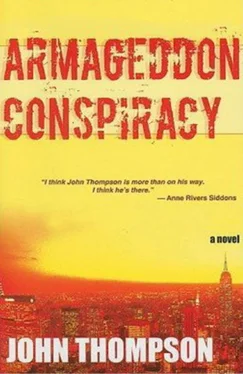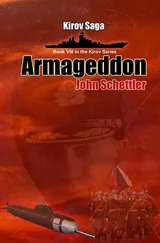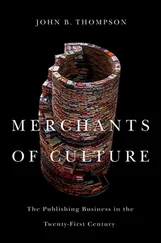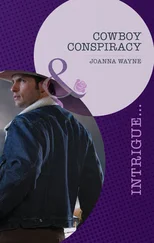The man bent down to take a choking breath, and in that same motion he turned toward the door. His eyes went wide in surprise as he saw Brent. A machine gun of some type was slung over his shoulder and hung at his chest, and faster than Brent would have thought possible, it was in the man’s hands.
Brent pulled the trigger three times, the bullets knocking the man back into the smoke. He took a reflexive breath, feeling the smoke sear his lungs. He started to cough, then backed into the passageway where the air was better and took several deep breaths. Finally, he crept forward again, toward the heat of the spreading fire. The man lay unmoving. Brent bent over him and jerked the machine gun free.
He moved back down the passage with the machine gun aimed at the open watertight door. Outside, as he sucked greedy lungfuls of clean air, the engines suddenly stopped, their mechanical racket and vibration going utterly still. Brent moved to the bulkhead, and from somewhere forward, he heard a voice. He inched up the stairs until he spotted the ladder he’d missed earlier, and then he waited. Very soon a pair of feet appeared on the upper rungs. A man started to descend, facing outward, his gun sweeping the area.
Brent backed down the steps, through the watertight door and into the crew’s sitting room where he hid behind the door. A second later the man came into the passage. “Mohammed?” he called.
Brent heard him take a deep breath then start toward the engine room. He waited until the man walked past, and then he stepped into the passageway, put the machine gun’s metal stock to his wounded shoulder, and ignored the wrenching pain. “Freeze,” he cried. “Hands in the air!”
The terrorist raised his hands to shoulder height and turned very slowly, first only his head, a second later his shoulders. A machine gun similar to Brent’s hung from a sling around his neck. His expression showed neither surprise nor alarm. In spite of the thick yellow smoke Brent recognized his assailant from the parking garage. “Where is she?” he demanded. “The woman.”
The terrorist said nothing. “Where is she?” Brent said again.
The terrorist shook his head imperceptibly. Brent had been sighting down the barrel of the machine gun, but he raised his head slightly. “You’re going to tell me, you sonofabitch,” he said, just as the terrorist moved.
The man was extraordinarily quick. Because he didn’t reach for the machine gun, Brent hesitated, and the knife seemed to appear from nowhere, just an instantaneous flash in the smoke. At the last possible instant Brent threw himself sideways and pulled the trigger. The knife hit, clipping his ear where his throat had been a half second earlier. The terrorist’s machine gun was already in his hands, but Brent’s burst tore into his legs.
Brent rushed forward, ignoring the warmth of fresh blood on the side of his face. He grabbed the man’s gun and jerked the sling free of his shoulders. The man was conscious although from the amount of blood, Brent’s shots had clearly caught an artery.
“Where is she?” Brent demanded.
The terrorist looked up at him and shook his head.
“Tell me!” Brent shouted. He put his foot on the man’s mangled thigh and pressed.
The terrorist arched his back in agony, and air hissed through his teeth. But he said nothing.
Brent straightened up and looked down. The man was bleeding to death, but one of his hands was busy with something on the inside of his belt. Suddenly, Brent saw the blade of a second knife. He aimed at the man’s chest, but the terrorist’s hand never paused. “Game’s over,” he said, then pulled the trigger.
EAST RIVER, JULY 2
WHEN THE BOAT’S POWER SYSTEMS went dead, Abu Sayeed froze in the silence and listened. The wind and rain had slackened. He could hear the faint slap of waves against the hull. Seconds ticked past as he waited for some sign from Naif. Nothing happened for nearly a minute, but then came a muffled coughing sound, the bark of a silenced machine gun. A moment later, a second burst. When Naif still did not call out, Abu Sayeed assumed the worst. Where had his enemies come from? How had they gotten on board? When? How many?
With no time for hesitation or regret, he moved to the flybridge. The boat was on fire, its engines dead. They were rudderless and drifting with the current. He would never reach Manhattan, but he would wound America all the same. One by one he would launch the Strellas. After he’d sunk his poisoned harpoons deep in his enemy’s hide, he would try and escape with his hostages.
As he knelt beside the weapons crates, his mind raced with his contingency plan. He’d use each of the hostages, Anneliës as well, to trade for time or whatever he needed. Every warrior had to die—he had no regrets if it came to that. The Americans might eventually destroy him, but first he would strike a great blow for Allah.
He picked up the launcher, activated the system, and waited for the tone to indicate the passive infrared homing was operational. It needed only a few seconds to come on line, but the missile wouldn’t fire without the tone. It had a range of nearly three and a half miles. He planned to fire in the direction of LaGuardia Airport.
The tone was beeping faster, building toward a solid whine that would indicate the homing device was active, when something moved in his peripheral vision. He swung his head and saw a partial silhouette and the barrel of a gun at the top of the stern ladder. He lay the launcher down and reached for his Heckler & Koch, but a burst caught him twice in the abdomen and knocked him backward.
He felt rage and surprise, and his guts were on fire. He fired wildly toward the top of the steps. He backed into the cockpit, lifted his shirt, and saw two small holes. There was little blood, but he sensed the damage. He fired again through the open door, and then ignored the searing pain as he darted down the steps toward the lower deck. His only thought now—the hostages.
EAST RIVER, JULY 2
MAGGIE STRUGGLED TO FOCUS. THE knife was everything. The other woman was clawing at the carpet, trying to pivot around her dead legs in order to reach it. Biddle, too, had rolled on his side and was backing toward it. Maggie knew her life depended on getting there first, but she was terribly tired. The cabin lights had gone out then other lights had come on, but these were dim, soothing as nightlights. She wanted to close her eyes and sleep.
With all her effort she swung her legs off the bed and tried to stand. Her knees buckled. She went down hard, her shoulder striking a dresser. The pain gave her a few seconds of clarity.
She realized the room was filling with smoke, also that Biddle was about the grab the knife. She kicked him in the back, rolling him away and onto his stomach. Then she turned on her side and slid backward, groping blindly. The plastic cuffs had cut her circulation, and her fingers felt almost lifeless. She grasped the knife and tried to slide the blade inside the loop that bound her left wrist, only to lose her grip. Biddle was kicking at her, but she ignored him and kept struggling. The other woman was clearly injured, but she, too, was moving closer, her hands outstretched. On her fourth try Maggie managed to work the blade into the loop and began to saw.
The smoke was growing thicker. Her lungs burned. Biddle’s foot lashed out and caught her painfully in the thigh, but she didn’t stop. Finally, the left loop began to loosen. She sawed harder, and at last her hand came free.
The woman was trying to grab her legs as Maggie struggled to her feet, fighting dizziness and confusion, in some part of her brain knowing she had a concussion. She wondered if the boat was sinking. She had to escape, but first she needed air. Portholes were set into the hull on both sides of the stateroom, above the built-in dressers. She clambered onto one of the dressers and began frantically unscrewing the brass wing nuts around a porthole.
Читать дальше












